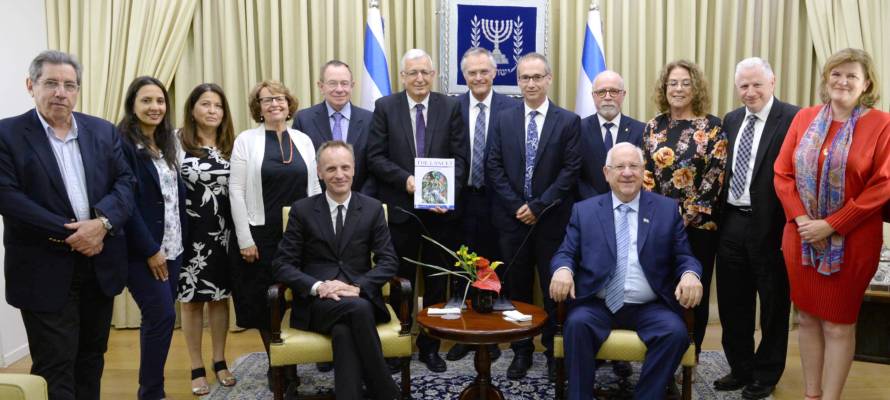“Medicine and science should guide politics, and not the other way around,” Rivlin stated upon receiving a journal dedicated to Israel’s superb healthcare and medical innovation.
Dr. Richard Horton, editor-in-chief of The Lancet, a world-renowned medical journal, presented President Reuven Rivlin on Thursday with a special issue dedicated to Israel’s healthcare system and medical innovation. The meeting, at the President’s residence, was also attended by senior medical figures and researchers who had contributed to the publication.
“I want to thank you, and everyone here, for the important initiative of this special magazine: to show Israel’s healthcare system to the whole world, in your respected journal. I am especially pleased this is also on your website, in English, in Hebrew and in Arabic,” Rivlin told the meeting, as communicated by the President’s spokesperson..
“As this special magazine shows, Israel’s medical care is among the most innovative and cutting edge in the world – both for treating mental illness, and physical illness. Israeli doctors, and researchers, make miracles happen every day; in hospitals in towns, in cities, and yes, even on the front-line of a war,” he added.
Indeed, for example, Israel continues to treat thousands of men, women and children wounded in the Syrian civil war, whisked away by IDF medical corps.
The President also noted the importance of healthcare accessibility in Israel to all segments of the population, saying, “I am proud that you have seen – and that your readers will see – the dedication of Israeli doctors and nurses; Arabs, Jews, religious, and secular. They treat everyone together. There is no difference between blood, there is no difference between life.”
During the summer of 2014, in the midst of Operation Protective Edge, The Lancet published “An Open Letter to the People of Gaza,” which criticized Israel’s policies and provoked intense debates in academia and medicine worldwide. Horton then accepted an invitation from Rambam Medical Center in Haifa to visit the hospital and observe the reality in Israel, specifically its healthcare system that employs Jews and Arabs alike and treats all segments of the population with equal dedication.
Rivlin: ‘Come to Israel, Be Our Partners’
Stressing the importance of collaboration on medical research over political differences, Rivlin said, “We should all work to be sure that medicine and science guide politics – and not the other way around. I want your readers to come to Israel. Come and see, all that we are doing here. Come and be our partners, in building a better future.”
In thanking Rivlin, Horton praised the Jewish state’s remarkable innovation. The journal’s special Israel edition, he said, “is a very important moment to celebrate the achievements of Israel in its short 69-year history, and your commitment to universal health coverage. Your fantastic ‘sick funds’, four of them, which are able to maximize the quality and efficiency of your health services, five world-class medical schools, internationally competitive research institutions, and a pluralistic, diverse, multi-ethnic society that so enriches your culture and prospects for the future.”
“We want to see Israel as a global society, extending international engagement and development cooperation with the rest of the world,” Horton continued. “This series and I personally utterly reject the boycott against Israel. Boycotts are no way to deal with difference of opinion. Boycotts entrench prejudice and hate, they perpetuate difference and we reject utterly that approach to discussing differences of opinion between communities and peoples.”
By: United with Israel Staff
Do You Love Israel? Make a Donation to Show Your Support!
Donate to vital charities that protect Israelis and help inspire millions around the world to support Israel too!
Now more than ever, Israel needs your help to fight and win the war -- and also the battle of public opinion.
Anti-Israel bias and boycotts are out of control. Israel's enemies effectively use social media to incite brutal terror against innocent Israeli civilians. Please help us fight back!




